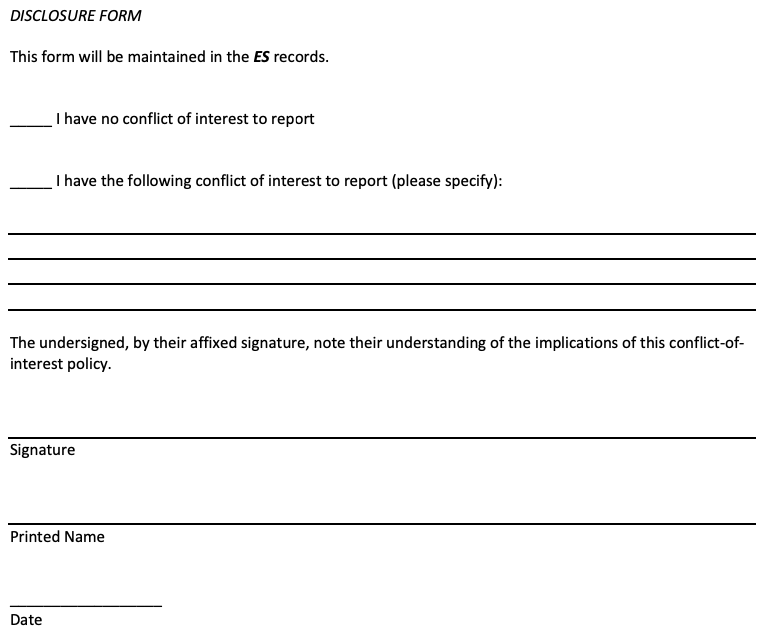
CONFLICT OF INTEREST POLICY FOR
ECCLESIASAFE CONSULTATION GROUP
March, 2022
It is the policy of EcclesiaSafe Consultation Group (ESCG) to protect the interest of EcclesiaSafe (ES) when it is contemplating entering a transaction or arrangement that might benefit the private interest of a person in trust or might result in a possible excess benefit transaction.
Although the legal standards for avoiding conflict of interest for nonprofit organizations are limited, ESCG will avoid, where possible, even the appearance of impropriety. This policy is intended to supplement but not replace any applicable state and federal laws governing conflict of interest applicable to nonprofit and charitable organizations.
Definitions: Conflict of Interest means a conflict, or the appearance of a conflict, between the private interests and official responsibilities of a person in a position of trust. Persons in a position of trust include any volunteer ES Consultants, coordinators, and/or Governing Committee members of ES. A conflict of interest is defined as a personal interest of a person in a position of trust as defined above that might impair or reasonably appear to impair the ability of the person to exercise independent, unbiased judgment on behalf of the ES.
PROCEDURE
-
- Full disclosure, by notice in writing, shall be made by the interested parties to the ES Coordinator, and ES Governing Committee in all conflicts of interest, including but not limited to the following:
- a. A Consultant is related to another Consultant by blood, marriage, or other business relationship.
- Full disclosure, by notice in writing, shall be made by the interested parties to the ES Coordinator, and ES Governing Committee in all conflicts of interest, including but not limited to the following:
-
-
- b. A Consultant stands to benefit from an ES transaction or receives payment for any subcontract, goods, or services.
-
-
-
- c. A Consultant is related by blood, marriage, or other business relationship to the members involved in an abuse situation brought to the ESCG.
- Following full disclosure of a possible conflict of interest or any condition listed above, the ES Governing Board shall determine whether a conflict of interest exists and, if so, the Board shall vote to authorize or reject the transaction or take any other action deemed necessary to address the conflict and protect ES’s best interests. Both votes shall be by a majority vote without counting the vote of any interested director, even if the disinterested directors are less than a quorum provided that at least one consenting director is disinterested.
-
- An interested ES Board member shall not participate in any discussion or debate of the ES Governing Board, or of any committee or subcommittee thereof in which the subject of discussion is a transaction, or situation in which there may be a perceived or actual conflict of interest. However, they may be present to provide clarifying information in such a discussion or debate unless objected to by any present Board member.
- Anyone in a position to make decisions about spending ES’s resources (i.e., transactions such as purchases contracts) – who also stands to benefit from that decision – has a duty to disclose that conflict as soon as it arises (or becomes apparent); s/he should not participate in any final decisions.
- A copy of this policy shall be given to all Consultants upon commencement of such person’s relationship with the ESCG or at the official adoption of the stated policy. Each Consultant shall sign and date the policy at the beginning of her/his term of service and each year thereafter. Failure to sign does not nullify the policy.
- All specified parties must file this policy and disclosure form annually.


